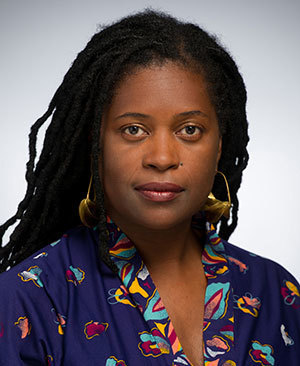 Z’étoile Imma
Z’étoile Imma
Z’étoile Imma, an assistant professor of English at Notre Dame, has received a prestigious Ford Foundation fellowship in support of her research in South Africa on 20th-century activist Simon Nkoli.
Imma is one of 116 top scholars to receive an award through the foundation’s fellowship program, administered by the National Research Council of the National Academies. The program seeks to increase diversity among university faculties, maximize the educational benefits of diversity, and increase the number of professors who use diversity as a resource for enriching education.
Imma’s research focuses on gender and sexuality in African and African diaspora literature and film, and many other areas in between.
“Imma is an energetic and engaged teacher who covers a wide variety of genres and media forms,” said Jesse Lander, an associate professor and chair of the Department of English. “She significantly extends the range of the department in both her research and her teaching. Her focus on African writers brings a crucial global perspective to a discipline that sometimes appears insular and parochial.
“In addition to her scholarly expertise on African literature and culture, Imma brings a fresh, critical intelligence to bear on the issues of race, gender, and sexuality. Her students consistently praise her passion and her commitment. An important new voice, Imma draws attention to sometimes uncomfortable truths and helps her students, the English Department, and the University to think globally.”
A Network of Support
The Ford fellowship will support Imma’s research on her book manuscript, tentatively titled Our Queer Mandela: Simon Nkoli, the Archive, and the Uses of an African Queer Icon. The project examines textual and visual representations of Nkoli, a renowned South African anti-apartheid and queer rights activist.
The yearlong fellowship has allowed Imma to move to Johannesburg, South Africa, where she is conducting archival research and writing the book. She is currently at the Universities of Free State and Witwatersrand.
“From here, I can not only spend my days in the archives that matter most to my project but be in dialogue with a broad set of esteemed scholars of South African studies,” she said, “I can also learn from the many committed LGBTI rights activists who, in many ways, continue to revitalize the legacy of Simon Nkoli.”
The fellowship also offers Imma access to a network of U.S.-based scholars of color working in the humanities and sciences.
“I am very grateful for the kind of ongoing support, mentorship, and the sharing of resources that Ford Fellow community engenders,” she said, “as these kinds of networks are crucial to a successful scholarly career in the academy.”
An Introduction to a Community
Imma first came to Notre Dame in 2012 for a Moreau post-doctoral fellowship, a program designed to attract and retain top young scholars who can contribute to the intellectual vibrancy, cultural competency, and research excellence of the University. She formally joined the faculty as an assistant professor in fall 2013.
“The Moreau fellowship was a wonderful opportunity to be introduced to the students, scholars, and staff that make up the Notre Dame community,” she said. “It was the consistent collegiality of the members of the English department and the students’ willingness to rigorously take up new and difficult forms of inquiry that made me eager to join the faculty here.
“I hope that the University continues to support the Moreau Fellowship and invests in and prioritizes mechanisms which make visible Notre Dame’s unwavering commitment to student and faculty diversity and inclusion.”
A Commitment to the Classroom
While Imma has previously focused her scholarship on literature from an African gender studies perspective, her work is increasingly engaging in critical race feminist analysis of contemporary African film, visual culture, and new media.
“I am interested in finding new ways to engage in African cultural studies methodologies and theories of decolonization which take up the question of human rights and development in Africa critically and meaningfully,” she said.
“I’m really excited about continuing my work in African gender and sexualities studies and, with the publication of my book, more firmly establishing my intellectual contribution to these fields.”
At Notre Dame, Imma aims to help students engage with a diverse set of non-Western intellectual traditions and forms of cultural production. She’ll return to campus later this year to teach two courses for the fall semester.
“I want my students to understand the many ways in which contemporary literature written in English is dynamic, global, postcolonial, and political,” she said. “In the classroom and beyond, I seek to highlight the important and potentially transformative contributions that African thinkers, intellectuals, and creatives make to our global understanding of what it means be human, just, and free.”
Originally published by at al.nd.edu on March 28, 2016.